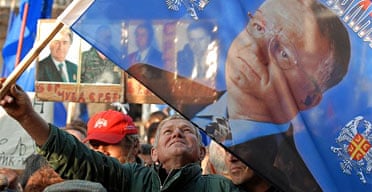The UN war crimes tribunal in The Hague last night ordered the force-feeding of a Serbian warlord and senior politician who has been on hunger strike in custody for almost a month.
The decision, the first such order since the court was set up more than a decade ago to deal with war crimes in the former Yugoslavia, came after a medical examination of Vojislav Seselj concluded that he might be a fortnight away from dying.
Mr Seselj, a former close associate of the late president Slobodan Milosevic and an ultra-nationalist leader who heads the strongest political party in Serbia, is an advocate of aggressive strategies aimed at creating a "Greater Serbia" by appropriating parts of Croatia and Bosnia and incorporating Albanian-populated Kosovo.
He is on trial for war crimes and crimes against humanity for his role in the Yugoslav wars of the 1990s, when he allegedly led paramilitaries in "ethnic cleansing" operations against non-Serbs in Croatia and Bosnia.
The tribunal last night told Dutch authorities to force-feed Mr Seselj if there was a risk of him dying. "There is a prevailing interest in continuing with the trial of the accused in order to serve the ends of justice," it said in a statement. "The trial ... should not be undermined by the accused's manipulative behaviour."
Mr Seselj, who surrendered to The Hague tribunal more than three years ago, has consistently sought to use the court as a stage to belittle and mock the institution. He went on hunger strike last month to demand unlimited conjugal visits and the opening of frozen bank accounts in the US, he insisted on defending himself at the trial and has hurled abuse at anyone who contradicts him. The warlord gained notoriety when in the early 90s he said the eyes of enemy Croats should be gouged out with rusty spoons.
His trial at The Hague only got under way last month after he had spent more than three years in custody. He refused to turn up in court and went on hunger strike. The trial was suspended last week as his health deteriorated. The Serbian government has been demanding that he be returned to the country for treatment.
Mr Seselj, refusing the assistance of Dutch or tribunal doctors, agreed to see a team of doctors from Serbia, Russia and France on Tuesday. They said he was in grave danger, at risk of an imminent heart attack and could die within two weeks.
He is the leader of the Serbian Radical party, which is leading opinion polls in Serbia ahead of general elections next month. He is top of the party's electoral list, guaranteeing him a seat in parliament, though he also faces a life sentence if found guilty of the war crimes charges.
About 30,000 Seselj supporters demonstrated in Belgrade at the weekend outside the American embassy, accusing Washington of being behind a plot to kill their leader. Mr Seselj's so-called last will and testament was read to the crowd, pledging Serbia to a pursuit of Greater Serbia that caused it to lose four wars in the 1990s and left tens of thousands dead.
Last night's statement from the tribunal was the first time it had resorted to such orders. It appears anxious to avoid creating another Serbian "martyr" after Milosevic died in its custody this year. Another Serbian warlord, Milan Babic, the former Croatian Serb leader, committed suicide while in custody.
The tribunal said it had issued an "urgent order to the Dutch authorities" to ensure Mr Seselj did not die as a result of his hunger strike, now in its 27th day.
While stating that any force-feeding deemed necessary for lifesaving purposes should not contradict "compelling internationally accepted standards of medical ethics or binding rules of international law", the judges at the tribunal also noted that the body of law laid down by the European court of human rights did not view force-feeding as "torture, inhuman or degrading treatment if there is a medical necessity to do so ... and if the manner in which the detainee is force-fed is not inhuman or degrading".
